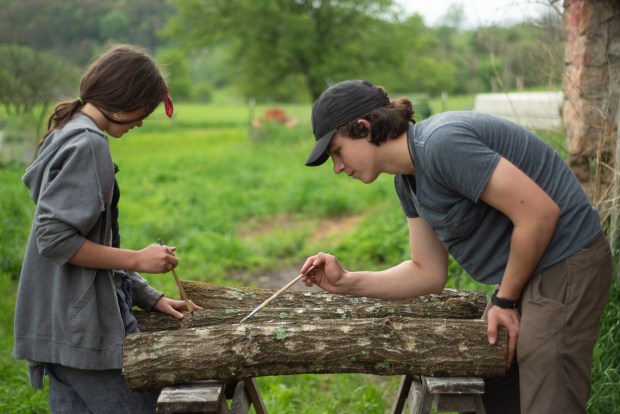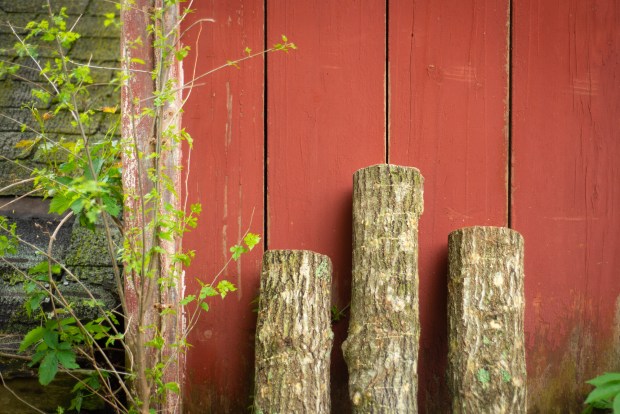
Are you feeling heart-heavy?
Yeah, here too. So yesterday, after a full homeschooling day (mostly math, spelling, and anti-racism work)—and a lot of reading and talking about what is happening just across the river in Minnesota—the kids and I needed some time outside to shake off the cobwebs and clear our heads. We headed down to the barn in a light rain to inoculate shiitake logs, a project we’ve had on the docket all season.
Though our hearts and minds were heavy, the work connected us, cleared our minds, and helped us ground out a bit.

Pete and I first inoculated shiitake logs 20 or so years ago. It’s been a while, but the process is the same as it was two decades ago.
Starting with fresh, oak logs, holes are drilled at a predetermined spacing, then wooden plugs or sawdust-impregnated with shiitake spawn are pounded into the holes.


The holes are then sealed with melted beeswax, and the logs are set aside to do their magical thing in a shady, north-facing nook.
It was the busy-hands sort of work that we all needed, and allowed a different energetic space for our conversations to continue, as all of us asked hard questions and reflected deeply on power and privilege.

Projects like these are among my favorite parts of homeschooling: these life-skills building projects that likely wouldn’t make the cut for most middle and high school curriculums. The forest and field and farm lessons that they will carry with them as they set off into the world, as well as the much-needed conversations that unfold when we engage in this way.

At the same time, I can’t help but notice how privileged we are to have the time and space, freedom, and safety to learn this way—among so many other privileges we barely even notice.
The disparities in our world are staggering; change is centuries overdue.
Keep listening and keep fighting, friends. Keep learning and talking and demanding change.

Resources for anti-racism work or anti-racism homeschooling
As a white family, I think it is vital that we do the work to turn the tide of racism in America. And so I’m beginning where I can: by reflecting upon my own biases and leaning in with my kids to explore racism and privilege and using our power for good in our homeschool.
Note: The books linked below are not affiliate links, but rather to go to my local, independent bookstore. If you prefer, search for your local bookshop on the Bookshop.org website, and order through them instead, and support the people who live in your community with your purchases.
This book is forming a cornerstone of our anti-racism homeschooling work. We’re only a few chapters in, but it’s appropriate so far for all ages.
I assigned this book to Sage (17). When Lupine (13) is older, she will read it as well.
Seeing White podcast (for older teens and adults)
Pre-screen the content of this podcast if you’ll be listening with younger kids, to be sure they are able to listen. This one is on Sage’s homeschooling list, but not Lupine’s.
Other books for adults and older teens include:
So You Want to Talk About Race
And finally, I don’t spend a ton of time on Facebook so I don’t have links for that platform, but if you’re on Instagram, here are a few favorite accounts to follow. Go there to simply listen, then do your own research to answer the questions that arise.
The Conscious Kid @theconsciouskid
Rachel Cargle @rachel.cargle
Ijeoma Oluo @ijeomaoluo
Antiracism Center @antiracismctr
Edited to add this extensive list.
What other books or resources would you add to the list above? If you are white, what are the important conversations are you having with your kids to generate meaningful change?

Thanks for this!
Shaun King is a great resource. When I lived in Milwaukee, I took a course at the YWCA called “Unlearning Racism” (which is where I learned about Shaun King). They have expanded the program to Madison and possibly other parts of the state..it might even be in La Crosse. It was eye-opening and a really great way to force me out of my box and understand how deep racism is embedded in our society. I might still have the binder on this subject if you’d like to look at it. I think you would enjoy the course if you had the time! I’ll bring it to the SG library.
That’s wonderful, Sarah. After things normalize I’d love to see it. Cele mentioned the upcoming change at the library – congratulations! We’ll talk soon. Thanks for offering!
Sarah, I completely agree! I’m hoping the YWCA will make these available virtually, so it’s accessible well beyond MKE and Madison.
Stamped – especially amazing on audiobook by Jason Reynolds.
Thanks, Joy!
Hi Rachel,
I follow your blog but my kids are a little younger and so I am curious, would you recommend The Anti-racist Book for a younger crew? Specifically 2nd and 4th grade or would it be best to wait for middle school?
We’re only 1/4 of the way in (or so) and so far it’s totally appropriate for kids of their ages. Some will be beyond them, of course, but it’s not too soon to start the conversation. I suggest picking it up and pre-screening, and seeing if you feel it’s a fit for their level.
The Warmth of Other Suns (Isabel Wilkerson, 2010) follows three people and their families during the Great Migration years apart from each other. It’s appropriate for teens, but maybe not much younger. And it’s a hefty book, a bit daunting, but I was engaged from the first page.
This book peels back later after layer of the insidious ways whites created an impossible hellscape for freed slaves. This has endured well beyond Jim Crow, and still echo loudly in our current society. It’s a must read, and will change the lens through which we see racism and privilege and our country’s terrible history.
Sounds like a powerful read. Thanks, Leah!
Oh, and How to be an Antiracist (Ibrahim X Kendi, 2019, author of Stamped/Stamped from the Beginning). Being “not racist” is not enough, we have to be actively anti-racist. It’s broken down into easy to digest chapters, each building upon the concepts of the last. And it’s fantastic.
(Ok, I’m done now! 😊)
Pardon the autocorrect – IBRAM X Kendi
Oh, yes! It’s on my list. x
Where do you get your shiitake spawn?
From local(ish) to me Field and Forest.